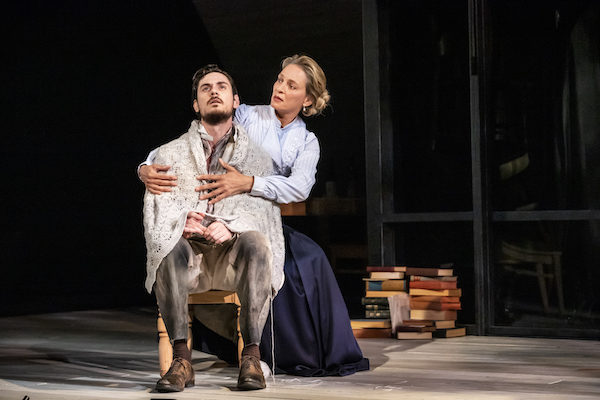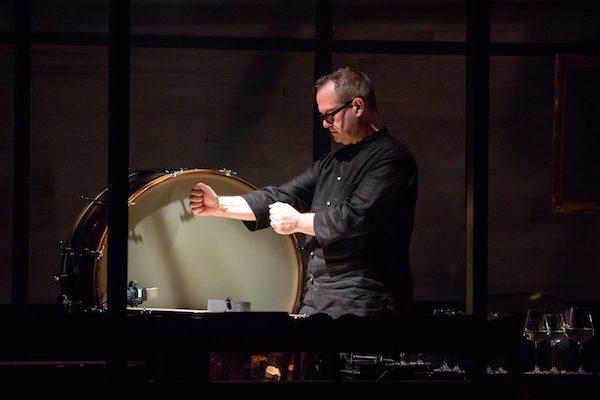Theater Review: “Ghosts” — Specters on the March
By Bill Marx
In this always compelling production, director Carey Perloff decided to bring the uncanny on stage, almost as a sixth character, in the form of composer/musician David Coulter.
Ghosts by Henrik Ibsen. Translated from the Norwegian by Paul Walsh. Directed by Carey Perloff. Staged by the Williamstown Theatre Festival on its Main Stage, Williamstown, MA, through August 18.

Tom Pecinka and Uma Thurman in the WTF production of “Ghosts.” Photo: Joseph O’Malley.
In a Williamstown Theatre Festival video interview about his sleek translation of Henrik Ibsen’s Ghosts, Paul Walsh mentions that the title in Norwegian might pertain to zombies as well as protoplasm. The notion that Ibsen’s cursed characters (Mrs. Alving and company) are dead bourgeois walking is intriguing; perhaps, for all its melodramatic trappings, the play drove audiences and critics mad in 1882 because it is a horror story, a morbid gathering of softened brains. The sensual sins of Captain Alving, the cowardice of the “free-thinking” Mrs. Alving, and the self-serving denial of Pastor Manders are the debilitated byproducts of the undead. Can anyone question the text’s relevance? (As we sleepwalk — eyes wide open — toward the chaos of Climate Change?)
For Ibsen, something is draining the life out of us; we are afraid of the risks of liberation and cling to the crippling conventions that shape society. He was not a nihilist, but dramatized its dehumanizing effects. In an 1882 letter, he confesses “all that [Ghosts] does is to point out that nihilism is fermenting under the surface, at home as everywhere else.” Arthur Miller is often seen as the American Ibsen (he copied from the best), but my candidate would be the Edward Albee of Virginia Woolf, Tiny Alice, and A Delicate Balance. In these scripts, non-being is on the march, as it is in Ibsen.
In this always compelling production, director Carey Perloff decides to bring the uncanny on stage, almost as a sixth character, in the figure of composer/musician David Coulter, who contributes a series of atonal and/or lyrical sounds, by way of water glasses, string instruments, percussion, and electronics. Sometimes the sour sounds are too insistent (underlining rather than suggesting), but just as often these flickers of spookiness generate a suitably neurotic atmosphere. For some, such as Boston Globe stage reviewer Don Aucoin, a Gold Star member of the Pastor Manders school of theater criticism, this is all a bit too much. Pipe in some elevator music! But, from the beginning of his career as a realist, Ibsen was fascinated by metatheatrical gestures. The self-consciousness of Perloff’s move would not have fazed a dramatist who brought in the voice of God (or is that an Angel?) at the end of Brand. Coulter stands behind a clear screen — he’s sometimes visible, sometimes not. He takes on a spectral visual resonance. Is he the ghost of avant-garde future?
Of course, the emotional power of the conflict revolves around the characters who are thrashing against the dying of the light (in themselves and others). Mrs. Alving, Oswald, Regina are wriggling on the end of the hook of hope. They believe, somehow, the past can be ameliorated for the sake of a brighter future. (Reinvention is rare in Ibsen.) Mrs. Alving’s disillusionment is the most harrowing: she believes she is in control, but ends up confronting a reality whose tragic horror beggars her imagination. As the protagonist, Uma Thurman brings a forthright innocence, a fervent emotional responsiveness, to the woman’s hapless transformation. The actress’s proud carriage crumples a bit more with every new disclosure. She skillfully (and passionately) travels from delusions of triumph to defeated hysteria.
The other members of the WTF cast are variable: Bernard White offers up a wind-up prig of a Pastor Manders. (It is an impossible role. Ibsen’s disdain for the Christian hypocrite is savage. Even Michael Gambon in the 1987 BBC video version of Ghosts can’t do much to soften the knothead’s edges.) Catherine Combs’s pent-in Regina comes alive once she is given the sobering facts of the case. Tom Pecinka nails Oswald’s alienation, a surliness that is driven by fear. But the performance is one-note — there’s not enough suggestion of Oswald’s vulnerability, his heartbreaking regret at losing what life has to offer. (After all, he comes home knowing he is a zombie.) Thom Sesma’s Jacob Engstrand is a seriocomic scallywag who, for my taste, could use a bit more steely depravity.

David Coulter in action in the WTF production of “Ghosts.” Photo: Jeremy Daniel.
It is wonderful to see a satisfyingly imaginative production of the great Ibsen, whose plays has been scarce in the Boston area for well over a decade. In 2006, when I was at WBUR, I lamented that the only local acknowledgment of the centennial of the dramatist’s death was a staging of A Doll’s House by a small theater company. Since that time, aside from a mediocre production of A Doll’s House at the Huntington Theatre Company, that has been about it — for a dramatist many consider up there with Shakespeare and the Greeks. And who wrote fabulous roles for women. (In 2017, Yale Repertory Theatre mounted a very fine production of An Enemy of the People, with a translation by Paul Walsh.)
I have hopes this embarrassing neglect might be turned around. The New York Times liked the WTF’s production of Ghosts, and Boston tends to follow (mechanically) the whims of New York and London (aside from the A.R.T.’s Diane Paulus, who feeds Broadway). Last May in London there was a highly acclaimed production of Rosmersholm. A snippet from the Financial Times review: On Rosmersholm’s opening night, lines from Duncan Macmillan’s new English version dropped like firecrackers: “You see, this is what happens when the general public becomes engaged with politics — they get duped into voting against their own interests.” As I write, David Hare’s free adaptation of Peer Gynt (titled Peter Gynt) is running at the National Theatre, to enthusiastic reviews. There is mounting proof that Ibsen is our contemporary — let’s hope more theater companies in New England will be convinced.
Bill Marx is the editor-in-chief of The Arts Fuse. For over three decades, he has written about arts and culture for print, broadcast, and online. He has regularly reviewed theater for National Public Radio Station WBUR and The Boston Globe. He created and edited WBUR Online Arts, a cultural webzine that in 2004 won an Online Journalism Award for Specialty Journalism. In 2007 he created The Arts Fuse, an online magazine dedicated to covering arts and culture in Boston and throughout New England.

While I agree that productions of Ibsen should encouraged, I found this one misguided in its casting, design and inclusion of composer as centerpiece. Even the dignified perfomance by Uma Thurman could not redeem this production for us. What a waste of money!
We disagree about this one. To see Ibsen as a realist, and only to be staged as one, does a disservice to his artistic vision, which, as I mention in the review, was open to meta-theatrical ideas, such as having a composer/musician on stage.
A funny line about the Globe’s Dan Aucoin–“the Pastor Manders of criticism”- though a bit gratuitous, as the Globe also liked this production, Marx and Aucoin in sync.
Only a very little bit off — I am tweaking the Globe critic about his discomfort with having a musician onstage during the production. Overall, I will stick by my characterization — when has Aucoin, like Manders, ever been anything but utterly safe and conventional in his criticism?